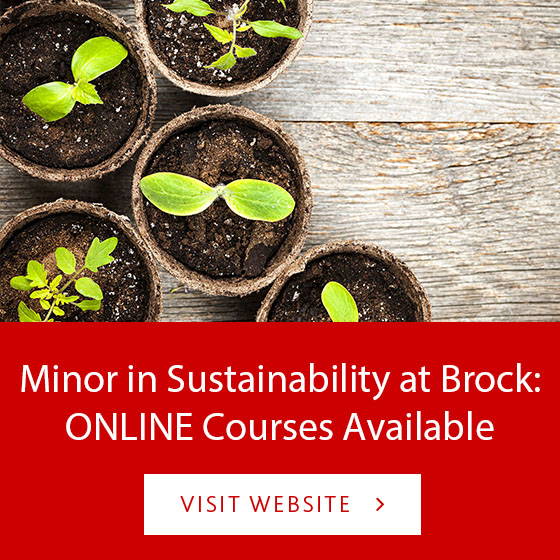Blog Contributor: Kassie Burns

A class trip contributed to an ongoing Brock-Lincoln Living Lab research project assisting the Town of Lincoln with research to inform management strategies for their urban tree canopy. Dr. Marilyne Jollineau and Master of Sustainability alumnus, Baharak Razaghirad, have continued Baharak’s thesis work that included an urban tree canopy assessment for the Town. While in the field, the class collected global positioning system (GPS) data of individual trees and recorded information including tree species type, diameter at breast height, tree condition, and other characteristics used to calculate the dollar value to the ecosystem benefits provided by each tree. Ecosystem benefits are ones that naturally occur in the environment that provide some service to improve human quality of life, such as air and water quality. Students collected data on approximately 30 trees representing total annual benefits of approximately $2,000 saved in ecosystem benefits! This information is available on a collaborative crowd-sourced platform for tree inventory, ecosystem service calculation, and community engagement called OpenTreeMap. This platform can be accessed by the public to add and/or view these trees and to calculate their eco-benefits.
I was fortunate to be able to help with this project through the graduate class (SSAS 5P13) entitled Landscape Ecology and Ecosystem Management, instructed by Dr. Marilyne Jollineau. On a field trip taken to Charles Daley Park (CDP), the class was able to help contribute to the OpenTreeMap database by conducting similar field research observations as mentioned above. The exposure to working in the field left me with so many learning opportunities and positive memories.
- Helped contribute to a project that helps a municipality evaluate its tree canopy resources.
- Increased tree inventory data in an area vulnerable to climate change.
- Provided field work data that can help determine tree location and new sites to plant trees.
- Obtained data on tree size to assess extent of ecosystem services provided for the Town.
- Gained practical experience in the field.
- Used equipment such as GARMIN eTrex 30 GPS device to map precise location of trees.
- Acquired knowledge on proper techniques to measure tree diameter.
- Identified species, reported tree characteristics/observations, and tagged trees analyzed.
- Appreciated the time required to plan and gather materials prior to conducting field work.
- Learned more about the location, landscape, and shoreline issues.
- In 2017 the Town of Lincoln had a flooding event leading to a voluntary evacuation of the shoreline residents at CDP (DeCock-Caspell, 2020).
- The remnants of foundations of homes can still be seen in the water.
- Construction of the QEW narrowed both sides of the creek that could have led to a bottleneck effect that impacted water flow (DeCock-Caspell, 2020).
- A wetland now resides off the shoreline.
References
DeCock-Caspell, M. (2020). If Coastlines Could Talk…A Story of Lincoln, Ontario. Retrieved November 5, 2022, from https://storymaps.arcgis.com/stories/8997ca2440e24be4881612411ff6bf95






































